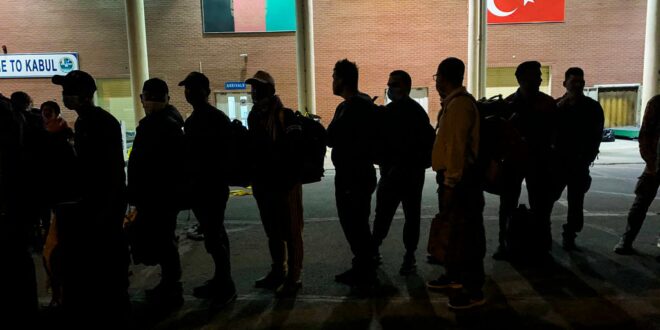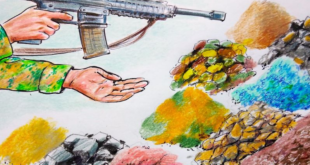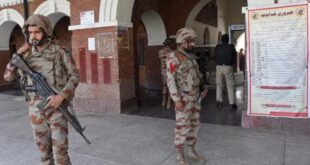The US and the EU should not buy Turkish President Recep Tayyip Erdogan’s fake pro-Western posture (such as when he offered to run the Kabul airport, then fled) or his fake anti-radicalism (such as when he is courting the Afghan terrorists). Erdogan’s strategy, as a member of NATO, is clearly to bolster Russia’s and China’s plans for the future of Afghanistan.
Iran, for its part, seems to be hoping to hit two birds with one stone: by systematically facilitating the journey of illegal Afghans to Turkey and toward Greece, it might destabilize both Turkey and Europe.
“The persistence of Erdoğan’s relationship with Hekmatyar illustrates that it was wishful thinking to believe that Erdoğan was ever anything more than a jihadi in a business suit, no matter how many diplomats projected their hopes of change on him.” — Michael Rubin, Middle East expert, Washington Examiner, August 11, 2021.
Now, due to Erdogan’s long-term anti-Western ideology, he will probably be tempted to seek an alliance with whichever pro-sharia group(s) will, in the near future, be governing Afghanistan.
The US and the EU should not buy Turkish President Recep Tayyip Erdogan’s fake pro-Western posture (such as when he offered to run the Kabul airport, then fled) or his fake anti-radicalism (such as when he is courting the Afghan terrorists). Erdogan’s strategy, as a member of NATO, is clearly to bolster Russia’s and China’s plans for the future of Afghanistan.
When the Soviet Union invaded Afghanistan in December 1979 in support of the communist Afghan government, then in conflict with radical Muslim fighters, Turkey was having its own civil war between ultra-left and ultra-right factions. In September 1980, the Turkish military staged a coup d’état and banned all political parties, including Islamist ones.
Turkish Islamists set up the Welfare Party, which would also later be banned. In 1985, halfway into the Soviet invasion of Afghanistan, Erdoğan was the dynamic, 31-year-old Istanbul provincial chairman of the Welfare Party. It was at one anti-U.S., anti-West event that Erdoğan invited a terrorist, Gulbuddin Hekmatyar, to Istanbul.
Hekmatyar is a former mujahedeen and leader of the Hezb-e-Islami Gulbuddin political party. Ordinary Afghan citizens knew him as the “Butcher of Kabul” for shelling the city repeatedly for no other apparent reason than to make the murder stop.
There is one particular image that has surfaced time and time again to haunt the Turkish leader: A photo of Erdoğan sitting at the feet of Hekmatyar, who once was officially designated as a terrorist by the United Nations and the U.S. That photo was taken during the event in which Erdoğan hosted Hekmatyar in Istanbul in 1985.
The photo is still telling today, when, after the collapse of the Afghan government in August, Hekmatyar met with both Hamid Karzai, former President of Afghanistan, and Abdullah Abdullah, Chairman of the High Council for National Reconciliation and former Chief Executive, in Doha both seeking to form a government.
A few weeks ago, as Taliban’s footsteps were becoming louder in Kabul, Erdoğan once again switched sides and celebrated his ideological love affair with Afghanistan’s terrorists. “The Taliban’s understanding (or interpretation) of Islam does not contradict ours,” he said, shocking millions of secular Turks.
“Does it (Taliban’s understanding of Islam) really not contradict ours? That understanding is about gang-raping, killing women, locking them in their homes, selling girls as slaves, banning schools for girls. When has ours turned into this?” asked Gamze Taşçıer, an opposition member of parliament. “When has Turkey become a shariah state?” scores of other intellectuals asked Erdoğan.
Erdoğan’s overtures to the Taliban, moreover, were not just limited to highlighting his tolerance to shariah. “Our relevant institutions,” Erdoğan said, “are working on it, including talks with the Taliban, and I may also receive the leader of the Taliban.”
There are two more important ramifications of the Taliban’s advance and Turkey’s subsequent leniency. First, the Taliban’s capture of Kabul has ruined a Turkish plan to leave troops in the Afghan capital to operate the Hamid Karzai International Airport, a risk-filled task for which no other nation had volunteered.
Erdoğan had sought the job, it seems, to highlight Turkey’s strategic importance to the Western nations, most notably the U.S. With that, he was likely hoping to have more leverage on the Biden administration when Turkey and the U.S. negotiated their most difficult divergences, including potential new sanctions on the Turkish government due to Turkey’s acquisition of Russian-made S-400 air defense system. In short, Erdoğan was likely hoping to use the Kabul airport deal to reset deeply problematic ties with the U.S. by putting bilateral relations into a transactional frame. That way, Erdoğan’s Turkey would score a point in portraying itself as a reliable Western ally.
Only a couple of weeks before the Taliban’s capture of Kabul, Ankara and Washington were trying to iron out their differences for the terms and conditions of the Turkish control over Kabul’s airport. As recently as August 11, Turkey still seemed intent on running and guarding Kabul airport after other foreign troops had withdrawn from Afghanistan.
Meanwhile, on August 28, after speculation on social media that Greece would open its border to Afghan refugees until September 1, thousands of Afghan refugees flooded Turkey’s land border with Greece.
Iran, for its part, seems to be hoping to hit two birds with one stone: by systematically facilitating the journey of illegal Afghans to Turkey and toward Greece, it might destabilize both Turkey and Europe. The mullahs in Iran would presumably be only too happy to transport tens of thousands of Afghans to their country’s difficult border with Turkey. The rest would then be the problem of Sunni Turks and the West.
As the Middle East scholar and former Pentagon official Michael Rubin wrote, Erdoğan is also possibly seeking to utilize his partnership with Hekmatyar to help shape Afghanistan’s post-war political order. “The U.S. should not let them,” Rubin wrote.
"The persistence of Erdoğan's relationship with Hekmatyar illustrates that it was wishful thinking to believe that Erdoğan was ever anything more than a jihadi in a business suit, no matter how many diplomats projected their hopes of change on him."In short, there is this designated terrorist, Hekmatyar, whose relations with Erdogan date back to 1985. Hekmatyar is now in talks with both the Taliban and Erdogan for the future of Afghanistan, while Erdogan is in talks with the Taliban and probably trying to figure out where to jump next.
Erdogan had been trying to appease the U.S. by guarding the Kabul airport, but that plan collapsed after the Taliban advanced into Kabul. Erdogan therefore lost a bargaining chip for his future dealings with Biden and the US. Now, due to Erdogan’s long-term anti-Western ideology, he will probably be tempted to seek an alliance with whichever pro-sharia group(s) will, in the near future, be governing Afghanistan.
 Eurasia Press & News
Eurasia Press & News




